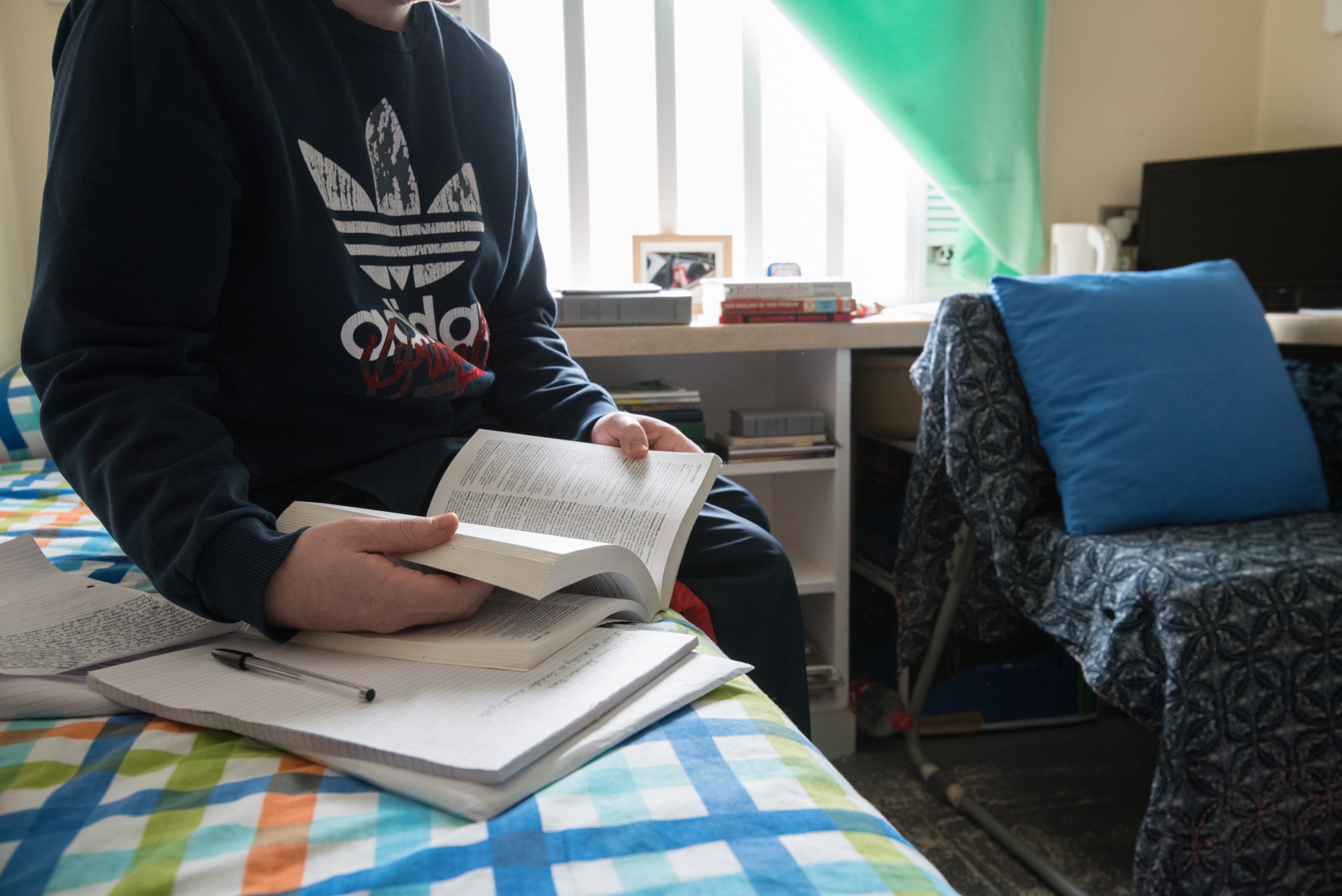
In the last of three blogs on how prisons are recovering from the pandemic and what this means for prison learners, PET’s Head of Policy Francesca Cooney reflects on the changes to in-cell study and the support that learners need to succeed.
During the lockdown introduced in prisons to limit the spread of Covid, education was provided through learning packs – printed out materials completed in-cell. As plans for recovery develop, it is clear that the prison service expects independent study to continue to be a big part of education delivery.
Prisoners’ Education Trust supports enabling learners to participate in individual study – after all, it’s what we do! But there needs to be more thought around how, when and where this happens and making sure learners get the support they need.
More time behind the door
Independent study does not automatically mean in-cell study.
A tiny room containing a bed and toilet, even when occupied by one person, is not always conducive to effective studying. We want to see opportunities for study on wings, in libraries and classrooms, and in other parts of the prison – during core hours, evenings and weekends.
We are concerned that the current planning for regime recovery will lead to more time behind the door, and that in-cell study could be used as a reason to try and justify this.
We have already seen that long periods locked in-cell can be extremely damaging to mental health and is known to reduce motivation. Lone in-cell study does not enable someone to develop transferable skills. It may also mean that people miss out on the essential social development skills needed for employment and resettlement.
In contrast, group settings and classroom activities support communication skills, problem-solving and teamwork – qualities often preferred by employers over and above the qualifications currently available in prisons.
The impact on educators
Less face-to-face classroom time also impacts on educators. Teachers are not working in prisons for the pay or conditions – they are there because they want to engage with learners, to inspire people to learn, and to make a difference to people’s lives.
Yet many are being asked to spend more time preparing in-cell packs and providing written feedback, rather than interacting with their students.
We know from our work that the reduction in face-to face time with learners has already served to demotivate prison educators and the current risk of many teachers leaving the service is high. Prisoners are also missing out on the significant pastoral support that educators provide.
‘Paper fatigue’
Some in-cell materials are fantastic, but this mode of learning is not suitable for everyone. And some learners are suffering from ‘paper fatigue’: after 12 months of learning in this way, they do not want to complete yet another in-cell pack.
Progress on digital technology has been too slow. While education providers have invested some resource in technology for prison education departments, this is only accessible to the learners that can physically get to education departments. Plans to roll out in-cell technology over the next year only cover a handful of prisons. Far more resources and far more action are needed to provide digital technology on wing and in-cell.
It is important that we are accurate and honest about what is being provided at the moment, because it is sometimes described as ‘blended learning’. But blended learning is not pushing paper-based packs under a cell door. Facilitating real blended learning involves face-to-face tutor time, digital technology, study-skills support, group work and access to libraries and study spaces outside of the cell.
Essential support for self-study
Through our work providing distance learning for over 30 years we know that additional support is necessary for most learners to complete courses successfully.
This can be telephone tutoring, study skills workshops, or information, advice and guidance. Other learners can also be invaluable in providing peer support through study groups or mentoring.
There is a risk that this will not be provided under the new arrangements.
The practical disincentives to self-study need to be removed. Access to stationery and writing materials should be standard provision (not purchased from prisoners’ own accounts) and in-cell education materials should be exempt from volumetric control, the rules limiting the amount of property a person can have in their cell.
Recognising education’s impact on safety and order
Wing officers and key workers are fundamental to the success of the new regimes, but our experience is that too few understand the importance of education, or the impact it can have on reoffending.
If learners are expected to complete more work in-cell and on the wing, officers need to be able to support this, and help to motivate and encourage learners. More work needs to be done to ensure wing and residential officers can identify and recognise education’s impact on safety and order, and on successful resettlement.
A purposeful, positive learning environment
Individual study can provide an effective stepping-stone for learners, leading to incredible achievements that open up further opportunities. But for this to happen, prison managers, education providers, teachers, officers and peer mentors need to work together to ensure that learners get the range of support they need.
Creating a purposeful, positive learning environment for individual study requires more than learning packs in-cell.